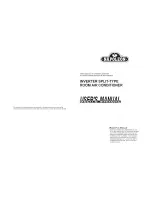
INS-57
DUAL, TRIPLE, POKER DC Inverter : 4. Installation
Multi Liberty
DC Inverter
14.2
ᨺ
17.2 N•m
(144
ᨺ
176 kgf•cm)
8.3
8.7
49.5
ᨺ
60.3 N•m
(504
ᨺ
616 kgf•cm)
15.4
15.8
Pipings’ diameter
Tightening torque
Dimension “A” (mm)
Min.
Max.
References for flaring
Ø6.35(1/4”)
Ø12.7(1/2”)
4. Connection of refrigerant pipings
Caution:
Caution:
Connection of refrigerant pipings
4.2 Flaring of refrigerant pipings:
4.1 Procedure for connection of refrigerant pipings
Cut refrigerant pipings by using the special roller pipe cutter.
Insert flared nuts on pipings and carry out a professional flaring avoiding the most common errors, shown in
the Figure above (cases 2, 3, 4).
Thermally insulate, by close cells’ material of suitable thickness, refrigerant piping connections and pipings
on both sides (Liquid & Gas). This material must be resistant to temperatures of at least 120°C. Strictly tape
insulating material, to avoid air pockets between pipings and insulating material itself (otherwise, there is
risk of condensation forming).
Check if splitting distance (also considering the number of bends on pipings) and splitting level distance
between Indoor Units and Outdoor Unit respect limitations indicated by the Manufacturer.
90°
Off-axis
Deformed
With burr
Connection of refrigerant pipings must be carried out by Authorized Technical Service, in accordance with
curnent regulations as fas as refrigerant installations are concerned.
Prevent water, humidity, polluting materials and foreign matters from entering pipins’ inside.
Refrigerant pipings must be carried out only after installation of Indoor and Outdoor Units.
Thermally insulate pipings on both sides (Liquid & Gas), as it is indicated further on.
1) Drill a wall hole of suitable diameter, for the passage of wiring and refrigerant connections, and cover the
hole‘s inside by a protective sleeve.
2) Strictly tape wiring and refrigerant pipings.
3) Refrigerant pipings must be set from outside to inside installation room.
4) Connect refrigerant pipings to Units, as it is explained further on.
5) Carry out the vacuum procedure of refrigerant pipings and of Indoor Unit, by using a vacuum pump.
6) In the end, if vacuum is not satisfactory - and after checking refrigerant (Flare) connections’ tightness -
open service valves on Outdoor Unit to let precharged refrigerant flow inside Outdoor Unit.
7) Check if there are leakages on flares, by using a gas leakage specific for detector R410A.
8) Cover the connection points with sleeves made of insulating material resistant to temperatures of at
least 120°C, and strictly tape insulating material to avoid inside air pockets.
1
2
3
4
The following Table shows recommended dimensions for flares and tightening torques of flared nuts.
















































